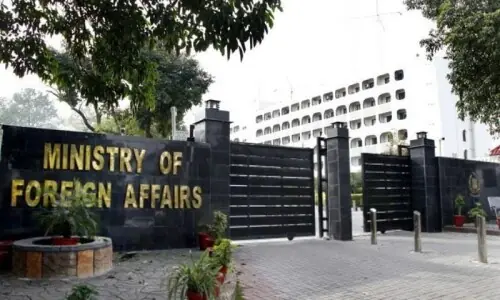THE evolving market landscape, with a deeper penetration of computers and mobile phones, has positioned Pakistan well to catch up with the global trend. Currently, the size of the e-commerce market is projected at about Rs3.1bn, whereas m-commerce has hit the Rs15bn mark.
Investors are betting on the tech-savvy millennials (age group 13-30), and the marketers on 3/4G technologies, as game changers for the e- and m-commerce in the country.
According to latest data on the website of the Internet Service Providers Association of Pakistan (ISPAP), there are 25m internet and 15m smartphone users in Pakistan — 13.5pc and 8.1pc respectively of the 184.35m population estimated by the Economic Survey 2012-13.
The global investors are intrigued by the reported volume of consumer spending, growth in mobile phone usage, stellar performance of multinational companies (Unilever, P&G, Nestle, Suzuki, Toyota, China Mobile, Telenor etc) and the success of global brands (Nike, Adidas, McDonalds, Pizza Hut, Levis, Mango, Ego, Next etc).
They find the ISPAP data understating the facts. Their research projects the number of online Pakistanis close to 40m — over one-fifth of the total population. Some others, however, believe that 90m people are active online.
‘The market is on the cusp of a change here, and will alter radically over the next decade’
According to latest World Bank data, per capita consumption is almost double the per capita income, reported to be $1,254 in the country in 2014. Per capita consumption was estimated at $2,000 in 2011. It would not be surprising if it touches $2,350 in 2014.
Market watchers also see yet another peculiar trend in Pakistan because m-commerce has picked up faster than e-commerce. “Thanks to fund transfer facilities [Easypaisa, Mobicash etc] provided by telcos, ordinary citezens have been provided a viable solution for their needs. However, online transactions have yet to move beyond utility bill payments in a big way,” an expert remarked.
“Based on our experience and an assessment of the customer’s profile, I firmly believe that the market is on the cusp of a change here, and will alter radically over the next decade. We hope to pitch in our bit and capitalise on the transformation by taking a lead in adjusting to the evolving market,” Muneeb Maayr, co-founder of an online shopping mall of high-end brands, Daraz, told Dawn.
“We are already dealing in 15,000 fashion items that we deliver to online customers on cash payment all over the country. Contrary to expectation, 60pc of our business is generated outside Karachi, Lahore and Islamabad. It is interesting to observe that in the fashion segment, women are less frequent website visitors but more liberal spenders. Men, if they order at all, go for cheaper items unlike women, who ignore price tag for their choices,” Maayr explained based on his experience.
Shedding light on the business model of online brand stores in the country, he said they operate, like any brick-and-mortar franchise store, on 30 to 60pc margins. For delivery, his company has tied up with two logistic companies. And conforming with global practice, the local online store offers ‘return facility in seven days’ with full reimbursement. The return ratio is 7pc here, against a high 50pc in developed countries.
“It is the replication of Amazon at a micro scale, adjusted to local conditions and market needs,” Maayr says. He hopes to line up some fashion firms to open shop and display new items at the online portal first before marketing them physically.
Some other dotcom startups in specialised segments have recently introduced the facility of online payment in addition to cash on delivery. They have forged a relationship with banks to offer the facility.
“The numbers have not pooled in yet, but the response to online payment facility is certainly better than what we expected,” Ahsan Mateen, MD Foodpanda, a food ordering portal, informed.
“Pakistanis like to receive their order before they pay. Yes, there are issues related to trust and we understand that it will take some time for companies to earn customers’ confidence,” Muntazir Haider, chief marketing officer of the company, said.
He said online companies dealing with mid-sized businesses have to invest time and effort in convincing reluctant suppliers to accept online payments.
Sharing background research, Talha Ansari, another young MD (mean age in dotcom companies is 26) said: “We know people spend more liberally when they are using credit cards. It is, therefore, not surprising that the average basket size of customers paying online is bigger than those paying in cash”.
The potential of growth in e- and m-commerce has also caught the attention of Rocket Internet, a renowned e-commerce-focused venture capital company. Rocket currently supports six businesses in the country: Carmundi (online car dealers), Daraz, Easy Taxi, Foodpanda, kaymu.pk (marketplace) and Lamundi (realtors).
Collectively, they reportedly generate annual revenue of Rs399bn. The worth of the initial investment by the company, which operates 75 ventures in 50 countries, has not been disclosed.
Online retail is not new to Pakistan, but its scale has changed. It started about two-and-a-half decades back in the book retail sector, followed by logistical companies. However, till five years back, its coverage was limited to a narrow segment of society.
Pakistan is a happening place that investors follow with interest despite all that is wrong with the country.
“A month long sit-in in Islamabad may cast doubts on the sustainability of democracy; attacks by rogue elements may force reassessment of claims of success in the operation against terror networks; and the devastation of flash floods exposed the quality of governance, but the country still blips bright on the investment radar of leading global brands and technology companies,” an expert concluded.
Published in Dawn, Economic & Business, Sep 15th, 2014


































